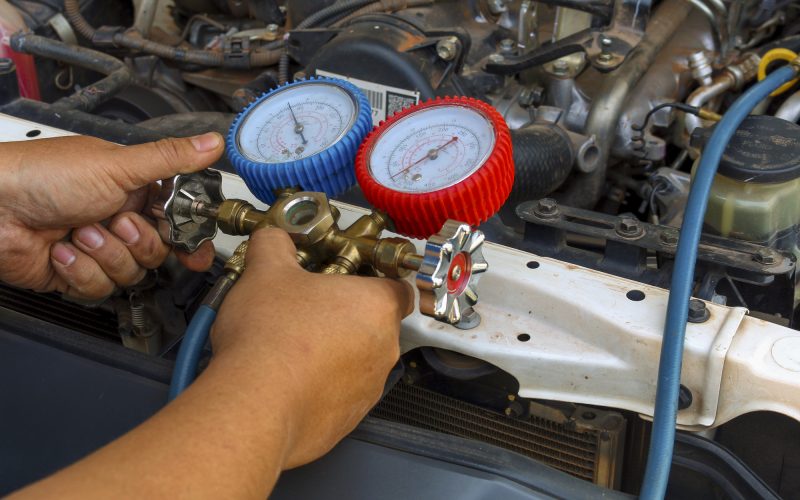Toyota Sienna AC Problems? Lean How to Fix It
A hot car is more than just an inconvenience, it can be deadly. When the AC stops working or starts to struggle to cool the car, even on high, it’s time for a fix. The longer you put it off or wait until it stops working altogether, the more serious the repair.
Knowing the primary Toyota Sienna AC problems can save you time, money, and some sanity. You don’t need to be a mechanic to be able to fix your own AC either. You just need to know the basics.
This guide should hopefully help you diagnose and fix some issues with your car’s AC.
Common Toyota Sienna AC Problems
Any of these problems can prevent your AC from performing at maximum efficiency.
Refrigerant Leak
A leak can occur in various stages of an air conditioner: the hoses, condenser, or the evaporator coils.
If you’re losing refrigerant, then your air conditioner loses degrees on its lowest operating temperature. It requires a sensitive balance of refrigerant and air to operate properly.
Replacing lost refrigerant is not something you should take upon yourself. Call your mechanic to check and repair any suspected leaks.
Refrigerant Charge
Besides an obvious leak of fluid, your refrigerant may just need to be charged to ‘activate’ it. This is a simple process and it can actually be done at home.
You would need to purchase an AC charger kit. Consult your car’s manual for information on properly charging your refrigerant.
Faulty Compressor
If your car has sufficient refrigerant but isn’t being moved efficiently throughout the system, then it could be the compressor. This is basically just a pump that maintains a certain level of pressure throughout the coils, hoses, and condenser.
You can usually tell when your compressor is going bad when the air conditioner is running louder than usual. The pump could just be vibrating but failing to move air throughout the system. If you don’t use your air conditioner frequently, it’s a good idea to switch it on and test the compressor.
Clogged Orifice Tube
Not to be confused with the standard AC hoses, the orifice tube runs from the condenser and the evaporator. You’ll notice it as a large tube in front of the radiator. Any debris that gets caught in this tube can greatly impact the flow of refrigerant.
This clog cannot be allowed to completely block passage or risk serious damage to the hose and/or evaporator.
Malfunctioning Fan
When your fan is starting to lose power, you’ll notice cold air only trickling out. If the temperature is right, but you can’t feel the cold air hitting you, your fan is probably broken. It might just be a wiring issue, but you’re probably better off replacing it just to be safe.
Stuck Blend Air Door
The blend air door controls the airflow in your car for heating or cooling. When this door is malfunctioning, the AC could be working harder to cool down the air. The reason being is because the car will utilize the hot air from the engine, but flip the blend door to recycle the car air for cooling.
The AC has to work twice as hard trying to cool air coming from the engine. This is something that only a mechanic can fix, so bring this issue up if you suspect cooling issues. If all other Toyota Sienna AC problems check out, the blend air door is usually the culprit for inefficiency.
Dirt or Moisture Build-up
If any foreign debris gets caught anywhere in your system, not just the orifice tube, it can cause corrosion. This can damage the valve, degrade the refrigerant, seize your bearings, and corrode all metal contacts.
Moisture can be just as dangerous, causing rust and mold issues. Moisture that mixes with the refrigerant can trigger ice to form on valves, as well.
Common Symptoms
Even if you know nothing about the different components involved with your AC system, you can still help diagnose the problem. This can be helpful for avoiding causing further damage unintentionally.
Air Is Not Cold Enough
With the fan on blast and dials turned down, if your AC isn’t able to cool you down, it could be a variety of issues. Fans on the condenser or radiator may not be moving air sufficiently. Debris stuck on the radiator or condenser can also impede cooling capabilities.
Clean the air cabin filter regularly and verify that the pressure inside the manifold is high enough to move cold air.
Pungent Odors
During the winter, your air conditioner can become a host for bacteria and fungus that thrive in dark, cold, and damp places. It doesn’t take much for you to start noticing their presence, even if you see no evidence. This requires a deep cleaning by a professional to flush out the entire system.
When to Call a Professional
This guide is simply a PSA for all owners with Toyota Sienna AC problems. This doesn’t mean that you should suddenly be an expert on all air conditioning issues. Being aware or knowing where to look when you suspect there are problems with your car will help you in the long run.
Try to stay on top of the parts that commonly fail, like the valves, accumulators, and driers. You can prevent some of the major failures from happening.
Regularly replace the expansion valve, accumulators, and receiver driers. These components are the most vulnerable to wear and tear and eventual failure. If they appear to be deteriorating or if they are suspect and it has been a while since the last replacement, it’s better to be safe than sorry.
Help preserve the condition of your car’s AC system by notifying a certified mechanic of where the issue may be. This can also help protect yourself from being taken advantage of by mechanics you are unfamiliar with.


